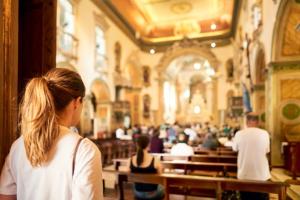 A friend, I’ll call him Chad,* once told me how his sister, Kayla, finally made the decision to become Catholic. Chad and his family had all chosen to convert to Catholicism over the course of a decade, starting with Chad. Kayla was a tough nut though, not willing to dive into the Tiber to swim over to Rome. Chad was frustrated. He’d been so successful in helping the rest of his family convert, but his dream of seeing his entire family become Catholic looked like it wouldn’t happen. Finally, he decided to back off, leave Kayla alone and focus on his other dream: getting married and starting a family.
A friend, I’ll call him Chad,* once told me how his sister, Kayla, finally made the decision to become Catholic. Chad and his family had all chosen to convert to Catholicism over the course of a decade, starting with Chad. Kayla was a tough nut though, not willing to dive into the Tiber to swim over to Rome. Chad was frustrated. He’d been so successful in helping the rest of his family convert, but his dream of seeing his entire family become Catholic looked like it wouldn’t happen. Finally, he decided to back off, leave Kayla alone and focus on his other dream: getting married and starting a family.
Chad found love with a cradle Catholic, Sylvia, and they made plans to marry in an elaborate nuptial Mass. The big day went off without a hitch and the newly-married couple left for their honeymoon. When they came back, Kayla had a belated wedding gift for Chad. She and her husband, Matt, had decided to become Catholic and would be entering RCIA that fall.
Of course, Chad was ecstatic and asked Kayla what had been the tipping point: the infallibility of the pope, sola scriptura, the Church’s teachings on Mary? Kayla shook her head. No. She and Matt had both been so moved witnessing Chad and Sylvia’s marriage that they decided they wanted to become Catholic after all.
I thought about Chad’s story when I heard from another friend, Liza, about her recent experience with family friends whose daughter, Ellie, was receiving confirmation. Liza was good friends with the family and regularly interacted with Ellie when the teen came to her home to babysit. Ellie and her family were observant Catholics, but Liza and her family had drifted away from practicing the faith. They were still Catholic, but for various reasons hadn’t gone back to Mass once the pandemic restrictions were lifted.
It’s confirmation season now, and Ellie commented to Liza a couple of weeks ago that she was being confirmed the next day. Liza was surprised she’d heard nothing about this from Ellie’s parents. She and her husband certainly would have arranged to go to the confirmation had they been invited. She couldn’t say that to Ellie though, so she just congratulated the teen. Later, she discussed the situation with a mutual friend and commented that she’d been hurt not to be invited to the ceremony.
Her friend shrugged. “You don’t attend Mass anymore. Ellie’s parents figured you would be uncomfortable to be asked, so they didn’t.”
When I worked as a professional apologist, I heard stories similar to Liza’s all the time. But I usually heard the stories from the point of view of the observant Catholics who were trying to decide whether to invite fallen-away Catholics to their special occasions. Should I invite my fallen-away Catholic friend/family member/next-door neighbor to my wedding, my kid’s baptism/First Communion/confirmation, my relative’s funeral? When we all get together at Christmas/Easter, should I invite this person to attend Mass with the rest of us? Oh, and if I do invite So-and-so to join us at Mass on this occasion and the invitation is accepted, how do I tell this person not to receive Communion?
My two standard pieces of advice in situations like this were “Don’t be a nuisance” and “Don’t make assumptions.” Let’s look first at how not to be a nuisance.
Accept “no” for an answer. If the person you hope will show up for this special occasion says “no, thank you,” accept that no graciously. Don’t pester, don’t nag, don’t shanghai that person for a guilt trip.
Give information, not instructions. This is also known as letting people take responsibility for themselves. If your fallen-away Catholic friend asks whether or not he should receive Communion, you can point him to the USCCB’s Guidelines for the Reception of Communion, which are often printed in parish missalettes. Keep in mind that many Catholics already know the rules for receiving Communion. If you’re not asked, information isn’t needed. Trust your friend to make his own decision.
Don’t pester the person to go back to Mass. If your friend chooses to go to Mass on a special occasion, great. Don’t spoil the win by using it as leverage to get your friend to attend Mass more often. Attending once in a while is okay. If you don’t believe me—hey, I know, I don’t practice very often myself these days—go ask Benedict XVI:
I have nothing against it, then, if people who all year long never visit a church go there at least on Christmas night or New Year’s Eve or on special occasions, because this is another way of belonging to the blessing of the sacred, to the light. There have to be various forms of participation and association; the Church has to be inwardly open (God and the World).
Now, how about not making assumptions.
Don’t make decisions for other people. Your fallen-away Catholic friend may not want to darken the doorstep of a Catholic church ever again. Or, perhaps this person is just taking a break from church attendance and is willing to go to Mass sometimes. Or, maybe she’s not willing to go to Mass most of the time, but is happy to attend the sacramental milestones of family and friends. You won’t know until you ask. Your job is to issue the invitation. You shouldn’t try to answer the invitation too.
Don’t judge another person’s soul. If the fallen-away Catholic shows up for Mass and chooses to receive Communion, that’s not your concern. For all you know, your friend may have slipped off to confession the Friday before the Special Event precisely to prepare for Communion. Offer up your anxiety over who should be receiving Communion to God. He’ll handle the matter. Just focus on preparing yourself to receive the Eucharist in a worthy fashion.
Stop grousing when people attend Mass occasionally. In the interest of full disclosure, I should confess that I was sometimes guilty of this when I attended Mass regularly. I freely admit that it could be a pain in the rear to try to find parking and a pew on the two days a year that the Holiday Catholics showed up for Mass. Nonetheless, I hope I’ve learned since then that begrudging the Once In Awhile Catholics room in the inn at Christmas and Easter is a Bad Idea.
If you’re frustrated with the Holiday Catholics crowding into “your” Mass, here’s a better idea. Go to the vigil Mass for Easter and to a morning Mass on Christmas Day. Attendance at those Masses is much lower. The fallen-aways will go to Mass on Easter Sunday because that’s their ritual observance for the holiday; they’ll go to Mass on Christmas Eve to watch the children’s pageant and have Christmas morning free for visiting and opening gifts.
There’s been discussion in some quarters about how to lure back Catholics who have stepped away from the Church for various reasons. When pandemic restrictions were lifted, some were hyperventilating over the possibility that Catholics given a dispensation to skip the Sunday/holy day obligation might not return to Mass once the dispensations ended.
For example, not long after the dispensation in San Diego ended, Catholic Answers ran a social media ad for Trent Horn’s book, Why We’re Catholic. The ad stated:
Most Catholics are finding their way back to confession, Mass and the sacraments. Some are not. As fellow Catholics we need to reach out and bring them home. We [at Catholic Answers] have something that will help.
At the time, I pointed out that many Catholics who have stopped going to Mass in recent years already know why they’re Catholic. They haven’t stopped attending Mass because they don’t understand the Church’s teaching on purgatory, the saints, or Mary, as Catholic Answers’ marketing team assumed. In some cases, these Catholics were converts to begin with, and embraced the faith because they’d been convinced of the Church’s teaching on doctrine and morals. But there’s another point that could be made. Many people who are struggling with some aspect of their lives dislike being handed a “self help” book and told, “Read this!”
Rather, for some strange reason, people want to feel valued. (Weird, I know.) They want connection, they want to feel included. Chad’s sister and her husband weren’t interested in Chad’s advocacy for Catholicism; they weren’t moved by his appeals to the reasonableness of faith. Gathered together with family and friends to witness Chad’s and Sylvia’s nuptial liturgy though, they realized there was something there they wanted to be part of, and the sense of connection persuaded them to give faith a try.
On the other hand, Liza and her family were hurt when Ellie’s parents didn’t bother to find out if they’d be interested in joining them for Ellie’s confirmation. An assumption was made that because Liza and her husband weren’t regular attendees at Sunday Mass that they had no interest in showing up for the sacramental milestone of someone they cared about. I can’t make any judgments as to how this will affect Liza and her husband in the long-term, but one opportunity to welcome them back to the Church was lost and another roadblock on the way back to faith may well have been erected.
Bottom line: If you want to bring people back to Mass, you might start by welcoming them to Mass on special occasions—and respecting their freedom to choose for themselves whether or not to accept the invitation.
*Nota bene: Names and some details have been altered to respect privacy.
(Image: Woman standing at door of church; iStock / Used with license.)










